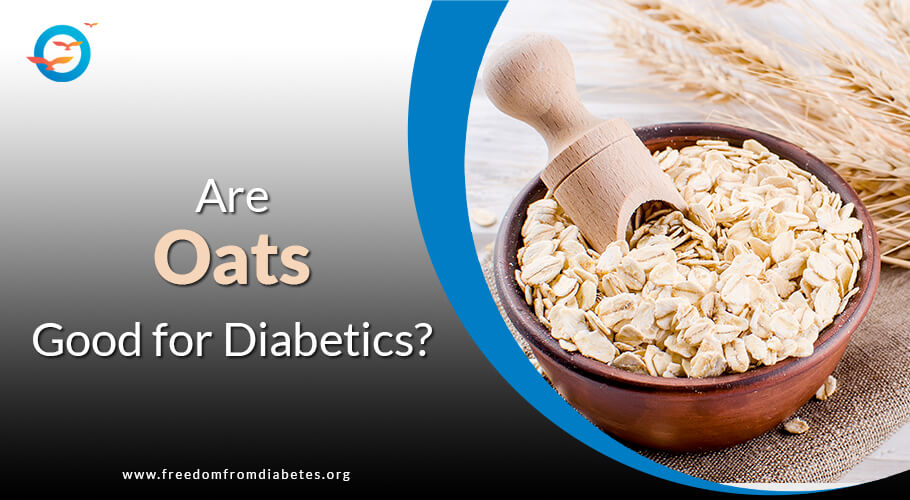Oats for Diabetes: Are Oats Good for Diabetics?

Oats for sugar patient
To cut to the chase: yes, oats are good for diabetics! Read on to find out why, the best varieties, and ways to consume them for maximum benefits.
A common refrain from people confronted with a bowl of oats is: oats are for horses. And while oats definitely are a staple for horses, they have some unique benefits for humans too–especially for people suffering from insulin resistance disorders, like diabetes.
Diabetes is directly impacted by blood sugar, which in turn, is affected by the kind of carbohydrates you consume and the quantity. The carbohydrates you eat are absorbed into the bloodstream at a rate that is proportionate to the quantity of carbohydrates and whether the carbohydrates contained in the food are simple or complex.
Simple carbohydrates are quickly absorbed into the bloodstream, causing your blood sugar to spike. Complex carbohydrates are more slowly released into the blood, and their effect on your blood sugar levels (BSL) is more even.
Thus your diet should ideally contain a high percentage of nutrient-rich, high-fiber carbs as opposed to refined/processed carbs or foods with added sugar. Oats contain all of the above, making it a great addition to the diabetes diet–with one proviso: the portion should be controlled.
A single cup of cooked oats has about 30 gm of carbohydrates, which is a suitable intake for a meal. Oats also have a low Glycemic Index (the rate at which glucose is absorbed into the bloodstream), which makes it a better alternative to traditional breakfast options like pancakes or cereals, which are very high in sugar.
Benefits of oats for diabetes
- BSL regulation:
Low GI, moderate carbohydrate and high fiber content work together to give oats the ability to keep blood sugar from spiking - Cholesterol control:
Oats have high soluble fiber content, enabling it to lower cholesterol, and making it a potent heart-healthy food - Quick & easy to cook:
With a little planning, oats are quick and easy to cook - Satiety inducing:
Oats’ high fiber content keeps you feeling full longer, effectively helping in weight management - Digestive aid:
Oats make for excellent roughage, and the high fiber content is also a good source of food for your gut bacteria - Anti-Inflammatory:
Oats contain compounds, such as avenanthramide, that have powerful inflammation-fighting properties
How to eat oat for diabetes
The ingredients you use to prepare your oatmeal to make a huge difference to both the taste and benefits of your meal.
To maximize the positive benefits, try adding the following to your oatmeal:
Add -Cinnamon, berries, and nuts–preferably presoaked and peeled.
Avoid animal dairy
- instead use water or a vegan milk substitute like soy, or almond milk
- If you want a higher dose of sweetness in your oats, opt for fresh fruit rather than dry fruit, which has higher GL. Nuts and berries are also good additions, as they add fiber, protein, and flavor to your oatmeal.
- Cooking also affects glucose absorption speed. The longer you cook your oats the higher the potential benefits—better BSL control, lower cholesterol and lower inflammation.
Quick-cooking (Instant) oats / Rolled Oats/ Steel cut oats
While all oats come from the same source: oat groats (hulled or crushed grain); the manner in which they are processed makes a big difference to their health benefits.
Types of oats
- Rolled oats diabetes
These are made from oat groats that are steamed and flattened to form flakes - Instant oats for diabetes
These are steamed for a long period and rolled into thin flakes, which speeds up cooking but increases their GI - Steel-cut oats for diabetes
Steel-cut oats are larger than rolled oats, which makes them long cooking oats; but, it also keeps the GI lower than instant oats
As steel-cut oats are the least processed version of oats, they are the most suitable for the diabetic diet. Rolled oats are actually pre-cooked, which also speeds up its sugar absorption.
Worst of all are instant oats. These have a higher GI rating, as well as a high Glycemic Load (GL)
Best oats for diabetes?
Oats offer excellent benefits for everyone. Diabetics will benefit greatly from having oatmeal instead of the usual refined sweetened breakfast cereals.
However, all oatmeals are not equal, steel-cut oats, while slower to cook are better than rolled oats which in turn are better than the instant oats variety.
Portion control, as in all foods, is advisable for oats too. The more you eat, simply means more carbs in your system. To check how oats are affecting your BSL, you can spill monitor your blood sugar before and after your meal. Always ensure you keep your doctor informed of any lifestyle changes.
FAQs
Are oats good for controlling blood sugar levels in diabetics?
Yes, Low GI Oats, with moderate carbohydrate, high fiber content prevent blood sugar sudden spik.
Which oats are good for diabetes?
Rolled oats, Instant oats , Steel-cut oats.
How do oats affect blood sugar spikes?
The soluble fiber in oats slows down digestion, which helps prevent sudden spikes in blood sugar, keeping levels stable.
Is it safe for diabetics to eat oats every day?
Yes, diabetics can eat oats daily, as long as portion sizes are controlled and they are paired with healthy, low-sugar toppings.

